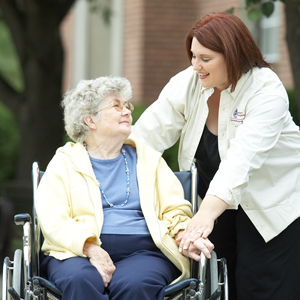5 Ways Technology Is Improving Medical Equipment For Seniors
Blog | March 6, 2018
When it comes to medical equipment for seniors, the advancements in technology continue to surprise and amaze us year after year, and it goes further than doctors and homecare workers simply walking around with tablets. As the scientists and engineers of the world develop computers that can fit on the head of a pin and are cloning various species of animals, it’s no wonder that unbelievable changes are also happening in the field of medicine. For a growing demographic such as seniors, this is great news. Technology is inching closer towards finding cures for age-related illnesses, or at the very least, finding effective ways to help manage them.
Common examples of medical equipment for seniors have previously included glucose and heart rate monitoring devices, wheelchairs, walkers, and a number of automated household devices, including stair lifts. These items have long been recognized as a standard among ailing seniors, not to mention a dependency on an array of medication. As such, it’s no wonder why there is a stigma surrounding getting older. It’s the “old” and outdated part that people remain hung up on. However, technology has been bringing this stale industry into the twenty-first century by way of incredible updates and a tech-forward approach.
Take the wheelchair for example. Toyota is revolutionizing their branding, evolving out of the vehicle market, and expanding into the human mobility space. They’re crafting gadgets that allow those with partial paralysis to walk again with the help from the Welwalk robotic leg brace. They’re also bringing a far-too advanced wheelchair concept – the iBot, designed to climb stairs and navigate rough terrain – back from the grave, but with modern improvements.
Toyota is not the only company that is modernizing the market of medical equipment for seniors. Fitbit is focusing more on overall health, rather than exclusively fitness, and has invested in the company, Sano, that specializes in a wearable continuous glucose monitoring (CGM) system that tracks glucose levels without the archaic action of having to prick your finger. This move is ahead of Apple – another company working within the CGM space – but is behind a company called Abbott. Abbott’s FreeStyle Libre is an FDA approved sensor that users can wear for up to ten days. It continuously monitors glucose levels through a hand-held device, eliminating the need for lances and turning an ancient and painful chore into an enjoyable way to acquire health data.
Even pills are getting a facelift in our modern age. There are now developments in ingestible capsules that can monitor internal data, such as cancer risk and diet. “Digital pills” such as C-Scan is a capsule that screens your body for colon cancer, whereas Atmo Bioscience created a pill that sends intestinal data to your smartphone via Bluetooth to monitor gastrointestinal disorders, such as Crohn’s disease and colitis.
It may all sound futuristic, but it’s actually the perfect time to introduce seniors to a new era in health monitoring and mobility. As seniors are slowly outnumbering many other demographics, the shift into advancing medical equipment for seniors is, frankly, long overdue.
Individualized Home Care Options
Long-Term Home Care, 24 Hour Home Care & Short Term Care Options Customized for You







